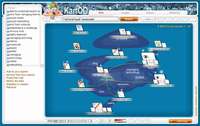In A Map of My Online Networking Tools: Part 1 I described the use of the MindMeister, a "mind mapping" tool, to display an organized list of the sites I use in relation to personal and professional networking.
Despite its ease of use and its out of the box support for publishing and collaboration, MindMeister is not the perfect tool for such an application. Displaying relationships among the different tools is not easy, and development of a "map" is essentially a manual process that requires manual updates. These issues need to be weighed against ease of use and ease of sharing, though, and for these I give MindMeister very high marks. In fact, I'm already using it to support a business proposal to a prospective client.

Example of Kartoo graphic search displayA different type of tool for mapping relationships that I have written about before is Kartoo. Kartoo displays relationships among web sites based on links and keyword-based concept groupings. You can see an example by clicking on the attached thumbnail image. The image is a screen shot of the results from a Kartoo search for the phrase "all kind food" (the old name of my blog, which I changed on August 17, 2007) plus the word "mcdonald" (my last name). Clicking on the topics shown on the left side of the screen re-focuses the search by adding that specific term or phrase to the search. If you do this you will probably be surprised with the linkages that you discover related to your own web site and interests.
While this particular sample search does not focus specifically on "social sites" it does include Linkedin, most likely because Linkedin can make available "public profiles" that are openly indexed and searchable by public search engines. An ideal situation would be for all social networks to follow this approach by allowing a member to select a subset of information for public availability and indexing. That way a search engine might conceivably be able to target sites with "social" features and thus -- automatically -- construct a constantly updated social network map.
Why would such a thing be useful?
I began investigating the visualization of social network relationships recently when I realized that social tools and networks are proliferating. Each additional group or community provides an additional way to develop and maintain relationships.
It also provides an additional opportunity to create content, content which may or may not be available web-wide for public access and retrieval. I decided to start mapping the tools in order to better understand the relationships among the different tools in order to develop a personal strategy around the creation and availability of content.
More generally, when you look at what a tool such as Kartoo can do to help visualize concepts and relationships, you cannot help but wonder about the underlying decisions and personal relationships that led to the creation of these links and these concept relationships. Individuals and groups of people are behind these labels.
Eventually, we'll probably be able to toggle back and forth among different web based knowledge representations -- by page, by concept, by institution, by person, by group -- but only if the information to support such a "semantic web" is available to be indexed.
